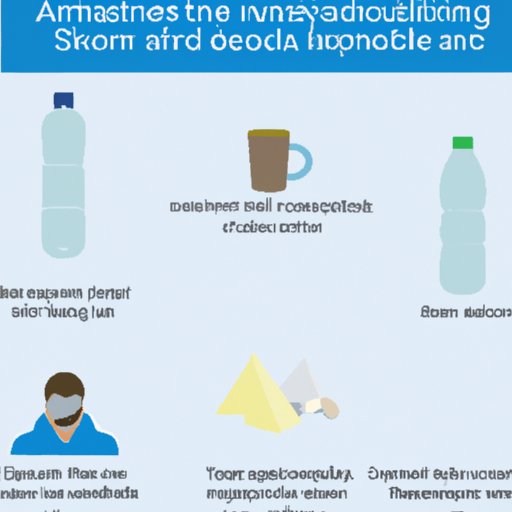Introduction
Altitude sickness, also known as acute mountain sickness (AMS), is a condition that occurs when someone travels to a high altitude too quickly. It can be caused by the reduced air pressure and lower oxygen levels at higher altitudes. Altitude sickness affects people differently, but some of the most common symptoms include headache, fatigue, nausea, dizziness, loss of appetite, and difficulty sleeping.
How to Prevent Altitude Sickness
Although there is no guaranteed way to completely prevent altitude sickness, there are steps you can take to reduce your risk. Here are some tips for preventing altitude sickness:
Acclimatize Gradually
The best way to prevent altitude sickness is to climb slowly and allow your body to adjust to the changing environment. According to the American Thoracic Society, “It takes approximately one to three days for the human body to acclimatize to an altitude of 8000 feet or more.” If you are planning to travel to a higher altitude, it is best to take a couple of days to rest at lower altitudes before continuing your journey.
Avoid Strenuous Activities
If you are feeling any symptoms of altitude sickness, it is important to stop and rest. According to a study from the University of California, San Francisco, “Exerting yourself too much while you are still acclimatizing can make your symptoms worse.” Therefore, it is important to avoid strenuous activities until you have had time to acclimatize.
Stay Hydrated
Drinking plenty of water is essential for your overall health, but it is especially important when you are at a higher altitude. According to a study from the Mayo Clinic, “Dehydration can worsen the symptoms of altitude sickness, so it is important to drink plenty of fluids.” It is recommended to drink at least two liters of water per day when you are at a higher altitude.
Reduce Caffeine Intake
Caffeine can dehydrate the body, which can make the symptoms of altitude sickness worse. Therefore, it is best to limit your caffeine intake when you are at a higher altitude. The American College of Sports Medicine recommends limiting your caffeine intake to no more than 200 milligrams per day when you are at a higher altitude.
Eat Light Meals
Eating light meals is essential for preventing altitude sickness. According to a study from the National Center for Biotechnology Information, “Heavy meals can cause nausea and other symptoms of altitude sickness.” It is best to stick to light meals such as salads, soups, and fruits when you are at a higher altitude.
Get Enough Sleep
Getting enough sleep is crucial for preventing altitude sickness. A study from the University of Utah found that “Sleep deprivation can increase the risk of developing altitude sickness.” Therefore, it is important to get at least eight hours of sleep per night when you are at a higher altitude.
Conclusion
Altitude sickness can be a serious condition if left untreated, so it is important to take precautions when travelling to higher altitudes. To prevent altitude sickness, it is best to acclimatize gradually, avoid strenuous activities, stay hydrated, reduce caffeine intake, eat light meals, and get enough sleep. By following these tips, you can reduce your risk of developing altitude sickness and enjoy your travels safely.
(Note: Is this article not meeting your expectations? Do you have knowledge or insights to share? Unlock new opportunities and expand your reach by joining our authors team. Click Registration to join us and share your expertise with our readers.)
